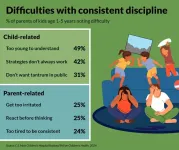(Press-News.org) ANN ARBOR, Mich. – When young children’s behavior becomes challenging, many parents resort to threats – from taking away toys to threatening that Santa will skip their house, a national poll suggests.
Parents of children ages three to five were most likely to say they use threats to address misbehavior – with a fourth threatening their child with no Santa or gifts – according to the University of Michigan Health C.S. Mott Children’s Hospital National Poll on Children’s Health.
Many parents have also threatened to leave an activity or place, take away toys or not get dessert while nearly half of parents polled have used bribes.
“Discipline helps young children learn what behaviors are safe and appropriate and can play a crucial role in helping them learn the difference between right and wrong,” said Mott pediatrician and Mott Poll co-director Susan Woolford, M.D.
“Empty threats, however, undermine trust and credibility and aren’t usually effective. Positive reinforcement and consistent discipline are more likely to shape long term behavior.”
Consistency is key
While half of parents rate themselves as very consistent in disciplining their child, many admit struggling with consistency, according to the nationally representative report based on 725 responses from parents with at least one child ages one to five surveyed in August.
Top challenges include a child being too young to understand, strategies not always working and parents trying to prevent a public tantrum.
Nearly a fourth of parents also say they get too irritated when their child misbehaves, react before remembering their strategies or are too tired to be consistent.
“It can be difficult to have a consistent approach to discipline without consideration and planning – and even then, consistency can be difficult, especially when parents are tired, distracted, or feeling overwhelmed,” Woolford said.
“It’s important for parents to plan ahead and be on the same page with discipline strategies to provide a foundation for understanding expectations and prevent sending mixed signals about boundaries.”
Parents may need guidance finding the best discipline strategies
Parents weren’t always sure whether their discipline strategies worked, with about two fifths saying they’re very effective and three in five believing they’re somewhat effective.
Most parents polled also reported getting input about discipline strategies from several sources, with many turning to the child’s other parent, talking with family and friends or using parenting books, articles and social media.
Meanwhile, less than a fifth of parents have discussed discipline with a healthcare provider and one in eight parents say they haven’t thought about their discipline strategies.
Some parents polled also admitted using discipline strategies that aren’t recommended by experts, with two in five sometimes spanking – which evidence suggests may lead to defiance and be linked to increased aggression in preschoolers and school aged children.
“Parents should avoid the temptation to rely on tactics that might yield short-term compliance but have negative effects later on,” Woolford said.
“Discipline strategies should be appropriate for the child’s age and developmental level.”
For children ages one to two, for example, distraction and redirection are often most effective, Woolford says, noting that children this young are exploring their environment and willful misbehavior is rare. Parents of children in this age group polled were also more likely to redirect behavior as a strategy.
But after age two, children understand their actions can cause a reaction from others and may increasingly test that out. Parents of children ages three to five polled were more likely to use warnings, speak firmly, and give timeouts.
During these preschool ages, Woolford says, strategies should emphasize logical consequences to misbehavior. For instance, if a child spills a drink out of anger, an appropriate punishment would be to have them clean up the mess while an unrelated punishment will be less effective.
“Consequences should be immediate, so the child understands the connection with their misbehavior,” she said.
She adds that since children respond differently to various discipline methods, parents should try to be flexible.
“As children grow, their responses to discipline will also change, so parents should adapt their strategies and stay open to new approaches,” she said.
“Balancing correction with positive reinforcement—like praise and rewards—helps children build self-esteem while learning from their mistakes.”
END
Naughty or Nice? Many parents rely on threats to manage misbehavior – from no dessert to no Santa
National poll suggests 1 in 4 parents have threatened preschool-aged children with no Santa or gifts; more than half have used bribes
2024-12-16
ELSE PRESS RELEASES FROM THIS DATE:
Completing the timetree of primates: a new way to map the evolutionary history of life on Earth
2024-12-16
The order Primates consists of not only our closest relatives on earth, the seven great apes, but also over 450 species of monkeys, lemurs, lorises, and galagos. Primates are fantastically diverse, from 400-pound gorillas to mouse lemurs (Microcebus) weighing just a single ounce. They exhibit some of the most remarkable behaviors observed in nature; chimpanzees ‘fish’ for termites in hollow logs using specially selected sticks, while orangutans use leaves as gloves to handle spiky durian fruit.
They are some of the most intensely studied species on Earth, and yet there is no comprehensive molecular phylogenetic hypothesis of primate evolutionary history that summarizes the pattern ...
Rapid evolution: Researchers discover surprising novelty in mechanisms that determine sex of the African clawed frog
2024-12-16
Hamilton, ON, Dec. 16, 2024 – Researchers at McMaster University have uncovered unexpected diversity in the genetic processes that determine the sex of the African clawed frog, a significant discovery in what was already one of the most widely studied amphibians in the world.
A genomic analysis has uncovered a total of eight different sex chromosomes in just 11 species of the frog, many or all of which may contain unique and newly evolved genes that trigger male or female sexual differentiation.
Previously, researchers had known of only three different sex chromosomes ...
Yeast as food emulsifier? Easily released protein as strong as casein
2024-12-16
Mention emulsifiers and many people might be unaware what they are used for, but they are present in many daily products, from food to cosmetics. They keep substances that don’t usually mix, like water and oil, from separating and are either synthetically made or derived from milk, eggs, and soybeans, which are known as major food allergens. Thus, Osaka Metropolitan University researchers are looking at yeast proteins as emulsifiers.
A research group led by Graduate School of Engineering Professor Masayuki Azuma and Associate Professor Yoshihiro Ojima previously showed that three yeast cell wall proteins ...
Microplastics floating in water, caught by floating drones
2024-12-16
In recent years, microplastics have garnered significant attention due to their detection in tap and bottled water, as well as in rivers, lakes, and oceans. Conventional filtering technologies for water treatment have difficulty effectively filtering out microplastics of various sizes and shapes and are prone to clogging. Additionally, recovering small particles requires extremely fine filter meshes, which increases pressure and drastically reduces filter efficiency. Furthermore, they are not effective in open spaces such as lakes, rivers, or oceans, where microplastic pollution is increasing.
Dr. Seong Jin Kim ...
Federal needle exchange programs are cost-effective to reduce health care costs, blood-borne infections
2024-12-16
“Needle exchange programs are evidence-based strategies that prevent transmission of blood-borne viruses, reduce injection-related infections, improve access to medical care, and facilitate entry into substance dependence programs for people who inject drugs,” writes Dr. Farah Houdroge, Disease Elimination Program, Burnet Institute, Melbourne, Australia, with coauthors.
The World Health Organization has set a target of reducing hepatitis C infections to fewer than 2 per 100 people who inject drugs per year as part of an elimination strategy for hepatitis C. In 2024, Canada unveiled its 2024–2030 Sexually Transmitted and ...
Butchered bones suggest violent ‘othering’ of enemies in Bronze Age Britain
2024-12-16
EMBARGOED UNTIL 00:01 UK TIME, Monday 16 December 2024 (19:01 ET Sunday 15 December 2024)
Volume 99 No 403 February 2025
We aim to have all papers online by 10:00 UK time.
More images and an embargoed preview of the paper can be found here: https://drive.google.com/drive/folders/1yMsUjDe7xuLWDCNgPH0XIX6dZtHkX2_c?usp=sharing
Analysis of the remains of at least 37 individuals from Early Bronze Age England finds they were killed, butchered, and probably consumed before being thrown down a 15m-deep shaft.
It is the largest-scale ...
Ditch TV and read a book: UniSA research delivers best moves to reduce dementia risk
2024-12-15
It’s that time of the year when most of us get the chance to sit back and enjoy some well-deserved down time. But whether you reach for the TV controller, or a favourite book, your choice could have implications for your long-term brain health, say researchers at the University of South Australia.
Assessing the 24-hour activity patterns of 397 older adults (aged 60+), researchers found that the context or type of activity that you engage in, matters when it comes to brain health. And specifically, that some sedentary (or sitting) behaviours are better for cognitive function than others.
When looking at different sedentary behaviours, they found ...
Scientists learn how to make nanotubes that point in one direction
2024-12-14
Tokyo, Japan – Researchers from Tokyo Metropolitan University have made tungsten disulfide nanotubes which point in the same direction when formed, for the first time. They used a sapphire surface under carefully controlled conditions to form arrayed tungsten disulfide nanotubes, each consisting of rolled nanosheets, using chemical vapor deposition. The team’s technique resolves the long-standing issue of jumbled orientations in collected amounts of nanotubes, promising real world device applications for the exotic anisotropy of single nanotubes.
Nanotubes consist of sheets of atoms rolled into a nanoscale tube, turning a two-dimensional ...
Porous silicon oxide electrodes: A breakthrough towards sustainable energy storage
2024-12-14
Batteries have become an integral component of modern technology. Lithium-ion batteries (LIBs) can be found virtually everywhere, from handheld electronic devices and electric vehicles to the large power banks used in renewable energy generation systems. However, current LIB designs suffer from some crippling drawbacks, including low durability and the use of toxic liquid electrolytes.
To address these limitations, scientists have been studying all-solid-state batteries for over a decade. Although silicon-based all-solid-state batteries should be theoretically more durable than conventional LIBs, ...
$791,000 grant to support future nematode-resistant soybean varieties
2024-12-13
By Jenifer Fouch
University of Arkansas System Division of Agriculture
Arkansas Agricultural Experiment Station
FAYETTEVILLE, Ark. — Causing an estimated $160 billion in damages globally each year, one of agriculture’s biggest enemies is too small to see without a microscope.
Plant-parasitic nematodes feed on agricultural crops at their roots, reducing yields and profits for producers. In the U.S., soybean producers lose about 11 percent of their crops to soybean diseases, including the southern root-knot nematode, Meloidogyne incognita, or SRKN as it’s commonly known. The nematode forms abnormal growths — or knots — in soybean ...
LAST 30 PRESS RELEASES:
New computation method for climate extremes: Researchers at the University of Graz reveal tenfold increase of heat over Europe
Does mental health affect mortality risk in adults with cancer?
EANM launches new award to accelerate alpha radioligand therapy research
Globe-trotting ancient ‘sea-salamander’ fossils rediscovered from Australia’s dawn of the Age of Dinosaurs
Roadmap for Europe’s biodiversity monitoring system
Novel camel antimicrobial peptides show promise against drug-resistant bacteria
Scientists discover why we know when to stop scratching an itch
A hidden reason inner ear cells die – and what it means for preventing hearing loss
Researchers discover how tuberculosis bacteria use a “stealth” mechanism to evade the immune system
New microscopy technique lets scientists see cells in unprecedented detail and color
Sometimes less is more: Scientists rethink how to pack medicine into tiny delivery capsules
Scientists build low-cost microscope to study living cells in zero gravity
The Biophysical Journal names Denis V. Titov the 2025 Paper of the Year-Early Career Investigator awardee
Scientists show how your body senses cold—and why menthol feels cool
Scientists deliver new molecule for getting DNA into cells
Study reveals insights about brain regions linked to OCD, informing potential treatments
Does ocean saltiness influence El Niño?
2026 Young Investigators: ONR celebrates new talent tackling warfighter challenges
Genetics help explain who gets the ‘telltale tingle’ from music, art and literature
Many Americans misunderstand medical aid in dying laws
Researchers publish landmark infectious disease study in ‘Science’
New NSF award supports innovative role-playing game approach to strengthening research security in academia
Kumar named to ACMA Emerging Leaders Program for 2026
AI language models could transform aquatic environmental risk assessment
New isotope tools reveal hidden pathways reshaping the global nitrogen cycle
Study reveals how antibiotic structure controls removal from water using biochar
Why chronic pain lasts longer in women: Immune cells offer clues
Toxic exposure creates epigenetic disease risk over 20 generations
More time spent on social media linked to steroid use intentions among boys and men
New study suggests a “kick it while it’s down” approach to cancer treatment could improve cure rates
[Press-News.org] Naughty or Nice? Many parents rely on threats to manage misbehavior – from no dessert to no SantaNational poll suggests 1 in 4 parents have threatened preschool-aged children with no Santa or gifts; more than half have used bribes








